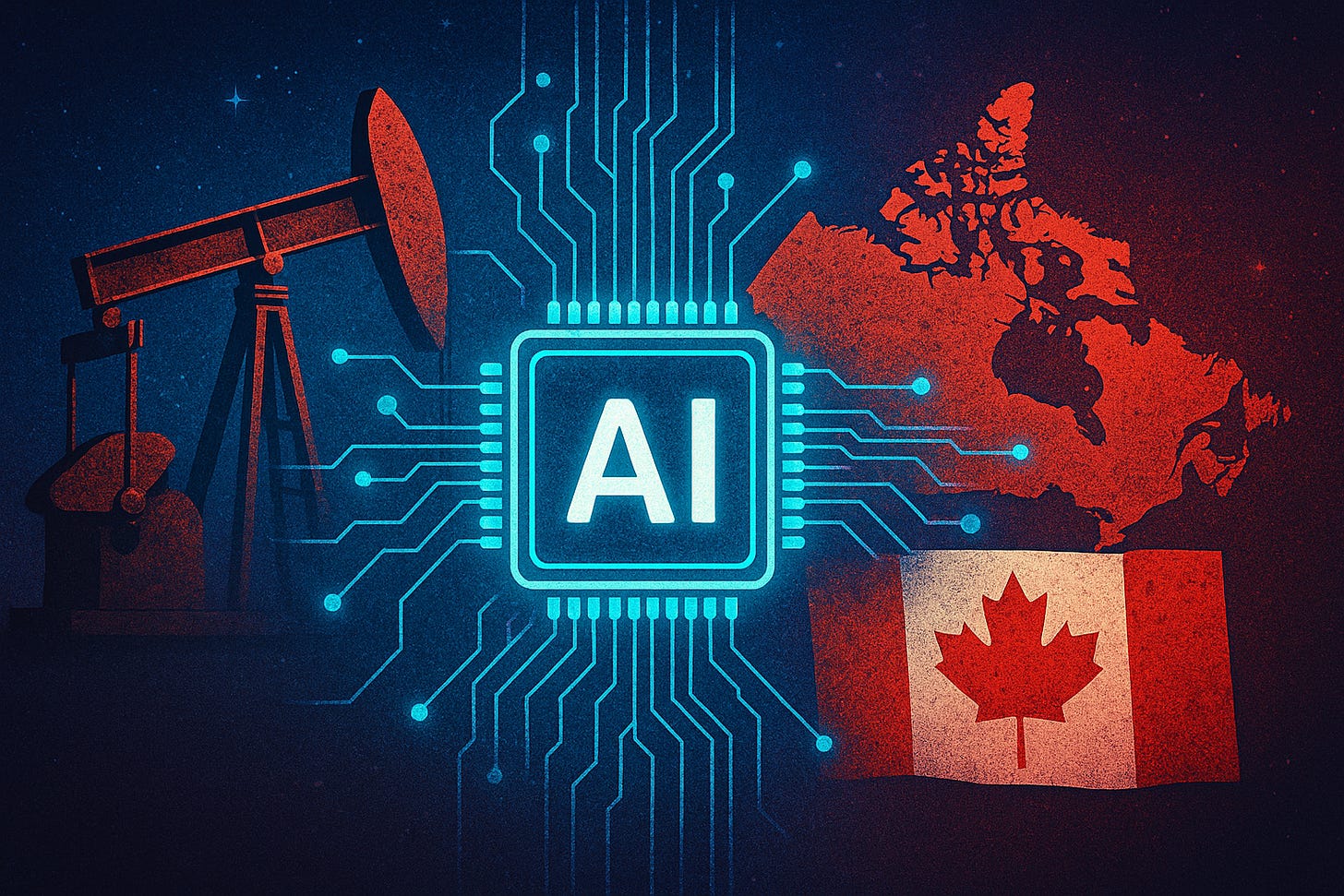Why Trump really wants Canada (Hint: It's Not the Oil)
The AI century will be built on energy and climate. Canada holds both.
AI is changing everything, faster than anything we have built before. We are watching models blow past human performance in task after task, and the compounding is brutal: once you optimize a model for a job, you can scale it at near-zero marginal cost. That is the corporate dream and the state’s dream: swap the most expensive input, human labor, for inference at scale.
If the 20th century crowned oil states, the 21st is going to crown AI states. Whoever runs the best models at the lowest cost wins. And the real constraint is not GPUs, it is energy, and the climate you run them in.
Here is the blunt truth: Trump does not want Canada for its oil. Alberta’s barrels are small compared to what really matters. What Washington needs is energy and climate advantages that can keep its AI ambitions alive.
The uncomfortable truth about the U.S. right now
Everyone assumes the U.S., the richest country on earth, is set up to dominate AI. On money and chips, sure. But energy is biting, hard.
The U.S. government has asked utilities to keep coal plants running longer to meet AI-driven demand.1
Northern Virginia, the world’s DC hub, had a near-blackout when about 60 data centers, roughly 1.5 GW, tripped off the grid in a single event.2
Texas passed a law that lets ERCOT curtail or disconnect very large data centers during emergencies.3
Meanwhile, the International Energy Agency says data-centre electricity use, pushed by AI, will more than double by 2030.4 This is not a curve you can finesse with a great hair-style and talking points. It is physics and steel.
What is at stake if America lags
This is not just a business story. It is a geopolitical one.
If the U.S. cannot power its AI ambitions, it risks falling behind in what amounts to a new arms race. China has already declared its goal of global AI leadership by 2030. Saudi Arabia and the UAE are spending billions to rebrand themselves as AI hubs. Europe is tying AI to sovereignty and defence.
The nation that owns the best AI will own more than efficiency. It will own the ability to design weapons faster, trade more ruthlessly, and manipulate information at scale. That is what “apex predator” status looks like in the digital century. Falling behind means ceding economic gravity, military edge, and cultural influence. In the Cold War the gap was nuclear missiles. In this one it will be AI models.
That is why America cannot afford to get energy wrong.
What makes Canada the real prize
Energy plus climate. In combination, that is the edge.
Clean, reliable power at continental scale. Hydro is the backbone, nuclear fills the baseload. Canada’s grid is already majority non-emitting, hydro alone was about 58 percent of generation in 2023.5
Cold air equals cheap cooling. In Québec, operators market “free cooling” for most of the year. AI campuses like QScale in Lévis are designed to ride that climate advantage and even recover waste heat.6
Direct pipes to U.S. load. The Champlain Hudson Power Express is slated to carry Québec hydro into New York City by mid-2026. The New England Clean Energy Connect aims to push 1,200 MW into New England.7
And you don’t have to look very deep to find out that Big Tech already knows where the puck is going:
Microsoft signed a 20-year deal that underwrites the restart of Three Mile Island Unit 1, renamed the Crane Clean Energy Center, about 835 to 837 MW, with operations now tracking for 2027.8
AWS locked up 1.9 GW of nuclear from Talen’s Susquehanna plant for Pennsylvania data centres.9
If you are in the White House and want to scale AI fast, Canada looks like a lifeline: clean baseload, cold climate, and power lines that can very easily be thickened.
Oil is the appetizer, energy and climate are the entrée
Yes, there is noise about oil. Alberta’s barrels are a door prize. But the real trophy in the AI century is deployable clean energy in cold air. GPUs are ovens, climate is a cost curve. You can build AI anywhere on a map, you can only run it cheaply in certain places.
That is why the USMCA 2026 review matters more than social media feuds. The treaty’s six-year review is a once-in-a-decade chance to tighten North American energy, minerals, and digital infrastructure into one AI-ready platform.10
Where Canadian politics are asleep at the wheel
Danielle Smith and Pierre Poilievre are still playing small-ball, trapped in a tar-sands-first imagination. Their message discipline on pipelines and carbon fights may work for a rally, but it misses the power reality of AI: the money is moving to compute-grade energy and cold-climate campuses. Alberta can be worth more for AI power and cooling than for bitumen over the next 20 years, if we choose to play that game.
Show me the Alberta platform for AI-dedicated baseload, interties, cooling water standards, waste-heat reuse, hydro-nuclear balancing, and mega-campus zoning. I have not seen it. What I see is Ottawa and Québec quietly stitching together the pipes while the so-called “economic” conservatives argue about yesterday’s commodity.
If you think that is harsh, ask yourself why Microsoft and Amazon are buying nuclear in bulk and why New York is tapping Québec on a fixed timeline. The scoreboard is not subtle.
So why would Trump want Canada?
Because if America cannot lock in Canadian energy and climate advantages, the U.S. AI roadmap gets more expensive, more political, and more fragile. That is the ballgame.
Think like a builder:
Firm power you can contract for 20 years.
Cold air you do not have to buy.
Cross-border wires that hit New York and New England on a 2025–2026 schedule.
A neighbor with critical minerals and an AI talent basin already in place.
None of this requires annexation. It requires interconnection, and a trade framework that treats AI energy like the new strategic commodity it is.
The only question that matters now
Do we want to be Norway, or the farm team?
Norway took an energy windfall and built a sovereign engine that compounds for citizens. Canada can do the same with AI energy and climate: treat it as a national endowment, not a one-off sale. Lock in the upside before the wires get signed and the campuses get sited.
Canada can be the AI superpower, not by tweeting about innovation, but by doing the boring, physical things: power, wires, cooling, water, siting, and talent.
Norway turned oil into an endowment. Canada now faces the same choice with energy and climate for AI. Whether we build it into a national asset will decide our place in the century ahead.
Because if energy equals AI growth, and climate sets the cost, then Canada has the map and the weather. Time to act like it.
Sources
Reuters. (2025, Sept. 25). U.S. urges utilities to keep coal plants running as AI demand booms. Retrieved from https://www.reuters.com
Data Center Dynamics. (2024, Jul.). Northern Virginia grid event trips ~60 data centers offline. Retrieved from https://www.datacenterdynamics.com
Houston Chronicle. (2025, May). Texas passes law to curtail large data centers in grid emergencies. Retrieved from https://www.houstonchronicle.com
International Energy Agency. (2025). Energy and AI Special Report. Retrieved from https://www.iea.org
Statistics Canada. (2023). Electricity supply and disposition. Retrieved from https://www150.statcan.gc.ca
CER. (2024). Market Snapshot: Data centers in Quebec and waste-heat reuse. Retrieved from https://www.cer-rec.gc.ca
CHPE Project. (2025). Champlain Hudson Power Express timeline. Retrieved from https://chpexpress.com
Reuters. (2025, Aug.). Constellation and Microsoft sign 20-year PPA for Three Mile Island restart. Retrieved from https://www.reuters.com
Utility Dive. (2023, Dec.). AWS strikes 1.9 GW nuclear power deal with Talen Energy. Retrieved from https://www.utilitydive.com
Government of Canada. (2025). Public consultations on the 2026 USMCA review. Retrieved from https://www.international.gc.ca






WATER will become the GOLD standard—- or beyond, in a frightening context.
I’m not kidding.
AI needs to be regulated immediately.
It uses way too much water. It could put our world at risk of untold greed and horrors. If people start treating water like what it is, the very essence of life…. it could get really ugly with water control and AI. WORLD WIDE REGULATION. Like yesterday
The US agriculture sector accounts for 16% of their GDP. AI accounts for 30% and it's in the hands of 4 people essentially, it is not a path forward. Or To be admired... It represents techofeudalism and the fall of humanity.